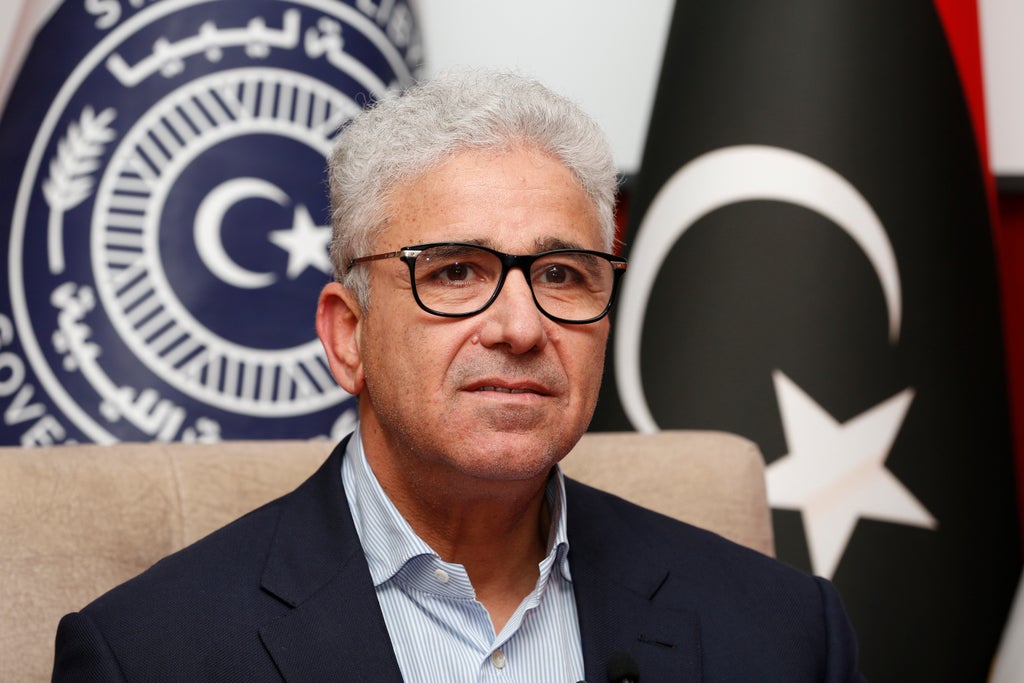
One of Libya’s rival prime ministers told The Associated Press that he has no immediate plans to rule from the capital of Tripoli, after his attempted move there last week sparked clashes and fears of a return to widespread civil strife.
In an interview late Wednesday, Prime Minister Fathi Bashagha said that his government will work from its headquarters in Sirte, a city on the Mediterranean coast about halfway between the country’s east and west. Rival administrations from each end of Libya claim to be its legitimate rulers until elections are held.
Describing last week's events, Bashagha said he had entered Tripoli in a civilian car and that those escorting him were unarmed. A young man was killed during the incident. Bashagha identified him as Ahmed Alashabab, calling him a supporter who was defending him from militiamen.
“We do blame ourselves for having entered the city," he said. "I had said that I would not enter the capital unless conditions were 100% favorable.”
Oil-rich Libya has been wracked by conflict since a NATO-backed uprising toppled and killed longtime dictator Moammar Gadhafi in 2011. It has been split between rival administrations in the east and west, each supported by different militias and foreign governments. The establishment of Bashagha’s government in Sirte is likely to further cement the political divide.
Bashagha, a former interior minister and air force pilot, was named prime minister by the country’s east-based parliament in February. But his rival, Prime Minister Abdul Hamid Dbeibah, based in Tripoli in the country’s west, has refused to step down, insisting he will hand over power only to an elected government.
Last week’s fighting in Tripoli was the most serious there since 2020, when east-based commander Khalifa Hifter and his forces waged a yearlong campaign to try to take the city with backing from Russian mercenaries. He eventually failed to do so, after Tripoli forces were bolstered by Turkish military help. Since then, U.N. mediators have tried to get the country on a path towards elections.
Dbeibah's appointment last year, as part of the U.N.-led process, was clouded by allegations of corruption and bribery. As an interim prime minister, Dbeibah was to have led the country through elections in December, but the vote never took place.
Both Dbeibah and Bashaga hail from the western city of Misrata, a base of influential militias.
Lawmakers have argued that Dbeibah’s mandate expired after Libya failed to hold presidential elections on schedule. The failure was a major blow to international efforts to end a decade of chaos in Libya. The country reverted to its long-running political impasse, with rival governments claiming power. Dbeibah has repeatedly promised to hold elections soon.
Bashagha said he doubts his rival can unite the country and organize orderly voting, claiming Dbeibah does not command enough loyalty outside of the capital.
“He will only be able to hold them in Tripoli,” he said, adding that his own government is looking at holding nationwide elections within 14 months.
The impasse worsened over the past two months, resulting in the closure of oil facilities — including Libya’s largest oil field — in areas controlled by Hifter’s forces. Bashagha said he was not behind the stoppage of oil production, but that local tribes had decided to take matters into their own hands, not wanting to fund Dbeibah’s government.
Bashagha said Abdel-Ghani al-Kikli, a Tripoli militia leader, was part of the effort to attack him after he entered Tripoli. Al-Kikli was previously implicated in war crimes by global rights groups, but was appointed by Dbeibah as head of a nebulous body called the Stability Support Authority last year.
Bashagha also addressed criticism that in areas under his control when he was interior minister under a previous Tripoli-based government, the situation remained abysmal for migrants setting out from Libya on Mediterranean crossings to Europe. After being intercepted, many are kept in squalid detention centers where they face torture, assault, and deprivation. Bashagha said he couldn't be held responsible, claiming he didn't have enough funding or staff to improve the situation.
Bashagha also called on the country’s Central Bank, torn by years of civil war, to pay out his government’s budget that was passed by the east-based lawmakers. The bank is the repository for billions of dollars annually in oil revenue as well as foreign reserves. In 2014, it splintered along the country’s broader political fault lines.

.png?w=600)





